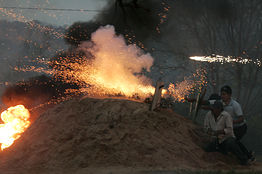Bolivian Talks Aim to Forestall a Violent Split
Morales Aide MeetsWith Opposition; A Mediator Is Shot
September 15, 2008 - Wall Street Journal
By JOHN LYONS - john.lyons@wsj.com
SANTA CRUZ, Bolivia -- Bolivian President Evo Morales agreed to negotiations meant to end a clash with opposition-led provinces after political violence killed as many as 30 people last week and government troops were deployed.
 (left) Bolivian farmers who support President Evo Morales were fighting demonstrators who want more autonomy. (Photo-Reuters)
(left) Bolivian farmers who support President Evo Morales were fighting demonstrators who want more autonomy. (Photo-Reuters)
Bolivian farmers who support President Evo Morales were fighting demonstrators who want more autonomy.
Talks in La Paz between the vice president and a representative of five opposition governors signaled a recognition by both sides that the chronically unstable, natural-gas-rich nation was veering again toward broad civil conflict. The talks, which began late Friday, were scheduled to continue Sunday night.
But while the negotiations may serve to cool tempers in the short run, few here showed much confidence they will resolve Bolivia's simmering standoff.
"All these guys know how to do is butt heads," said the owner of a small convenience store in Plan 3000, an impoverished Santa Cruz outskirt where Mr. Morales enjoys broad support. She was installing metal shields to her store windows to protect against nighttime fights between political gangs that often devolve into simple looting, she said. She declined to give her name for fear of reprisals.
Bolivia and Venezuela expelled their U.S. ambassadors last week, accusing the U.S. of orchestrating opposition to Mr. Morales, a charge the U.S. denied. Natural-gas supplies to Brazil -- which gets half its gas from Bolivia -- and Argentina were slowed last week after opponents of Morales damaged gas facilities. Venezuelan President Hugo Chávez, Mr. Morales's closest ally, vowed to fund an insurgency in Bolivia if its government falls.
South American leaders were scheduled to gather in Chile Monday to discuss a resolution, a key test for a new regional body called Unasur.
Near the midpoint of Mr. Morales's five-year term, Bolivia is splitting along geographic, racial and economic lines. Mr. Morales is seeking to lift his mainly poor, indigenous supporters by introducing a new socialist constitution. His vision is hamstrung by the governors of five economically crucial eastern provinces -- Santa Cruz, Beni, Pando, Tarija and Chuquisaca -- who view the constitution as a power grab and a recipe for economic ruin.
Four of the provinces have declared autonomy from the Morales government, so far a symbolic gesture only.
A series of local and national referendum votes has failed to dislodge the political deadlock, and each side is now resorting to tougher tactics. Mr. Morales is withholding tax revenue owed to the provinces. In response, protestors in the provinces ransacked government offices, blocked highways and allegedly damaged gas facilities.
Gangs of Morales supporters have thrown up their own roadblocks and occasionally clashed with the opposition.
The violence peaked last week when a group of Morales supporters marching near the capital of Pando province clashed with an anti-Morales militia. Authorities said on Saturday that the death toll from that clash and others could go past 30 as searchers continue to find bodies in the brush.
Mr. Morales responded by sending troops to secure the Pando airport. In a chaotic scene played on national television, government troops shot and killed an unarmed evangelical minister Saturday who was seeking to mediate between troops and protestors. Mr. Morales ordered the military to arrest the Pando governor and enforce a curfew. In practice, however, the military is confined to the airport.
The U.S. Embassy allowed its nonemergency personnel to leave the country. American Airlines cancelled flights into La Paz.
As a condition for negotiations with the government, opposition governors want the curfew and arrest warrant for the governor of Pando province lifted. They also want Mr. Morales to restore the provincial share of tax revenue and give the provinces greater autonomy in the new constitution. Mr. Morales has shown no sign of giving in to provincial demands. Instead, he is steeling for more violence.
"There are still costs to pay to achieve equality among Bolivians," Mr. Morales told supporters over the weekend.
Leaders in Santa Cruz began dismantling roadblocks Sunday in order to show support for the negotiations.
Violence isn't new in Bolivian politics. Mr. Morales was elected in 2005 after leading violent protests that helped topple two elected presidents. He won support from the nation's majority Indian population by promising a return to a period of communal living and economic equity he said existed before the Spanish conquest. To achieve this, he has nationalized industries and is pushing a new constitution that allows him to be re-elected, grants rights based on indigenous ethnicity, redefines private property and expands his economic control.
Mr. Morales, a leader of Bolivia's coca-leaf growers, has also clashed with the U.S. over counternarcotics efforts. When the U.S. ambassador was expelled, he was pressing the Morales government over security threats against U.S. Drug Enforcement Administration agents working in Bolivia's coca-producing Chapare region.
Write to John Lyons at john.lyons@wsj.com